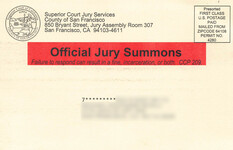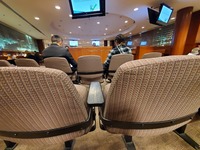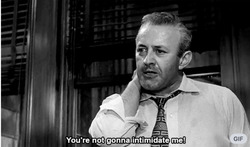 |
| Angelika/Mike Schilli |
|
Angelika You know it from various American TV series. In the U.S., twelve jurors decide in court cases whether the defendant is guilty or not. When the court calls, every American citizen must fulfill this jury duty. You've probably guesse it by now: In April, I had the pleasure of being live at one of these selection processes. But let's start from the beginning.
Surprisingly, it is quite unlikely to be selected as a juror because jurors go through a sophisticated and elaborate selection process. In Donald Trump's court case in New York, you might have noticed that it took weeks to select the 12 people. However, one must still report from time to time.
So, in March, a postcard from the "Superior Court" of San Francisco arrived, informing me that I should be ready from April 15 to possibly sit on a jury. Initially, I didn't think much about it because, in rare cases, one has to appear in person at the court. According to the postcard, on the Friday before the week of my jury duty term, I should check the court's website to see if there were any further instructions for my group (a three-digit number). Calling is also an option. Then, the potential juror receives instructions through the court's automated telephone system.
Possible scenarios include: 1) The juror is relieved of duty. Their group is not called. 2) They must check the website or call every day from Monday to Friday to see if they need to appear in person at the court. 3) They must appear in person.
On the mentioned Friday, we were still on vacation. When I casually checked the specified website, I had to rub my eyes at first. My group was clearly listed there, and people with my group number were instructed to appear in person at the court, which is located in San Francisco near the City Hall, on Monday.
I started to get a bit flustered. First, I had to inform my work that I wouldn't be coming in on Monday after the vacation and that I didn't know exactly how many days I would likely be absent, which is always well-received after more than two weeks of vacation.
By the way, the employer must grant you leave for jury duty but is not necessarily required to pay your salary during that time. An employee also cannot be fired for fulfilling their jury duty. The German school where I work pays the normal salary for up to 10 days. If a court case lasts longer than 10 days, you're out of luck. The court pays an allowance of $15 per day starting from the second day, which also includes the days of the selection process. However, our school requires that the $15 be given to the school.
You can surely imagine that this is a real problem for many people if no salary is paid during jury duty. Therefore, there are efforts to increase the allowance to $100 per day for those whose employers do not pay. The jury is supposed to represent the population, and often, people working in low-paying jobs do not receive continued pay.
However, the state does not want to make the role of a juror too lucrative, as it is considered a civic duty and even a privilege of every American citizen. By the way, any citizen can be called to fulfill this duty once a year, although longer intervals are the norm.
In any case, I made my way to the court on the mentioned Monday using public transportation. By the way, everyone automatically gets the fare ($6 per day) reimbursed starting from the second day. I was a bit excited because this isn't something you get to experience every day. I'm a big fan of the American series "Law and Order" and was very curious to see how the whole process unfolds in reality.
When I arrived at the courthouse, a long line had already formed in front of the door, which surprised me a bit. Then the doors opened. Everyone went through a security check, just like at the airport. However, you are allowed to bring everything, including your phone and laptop, into the courthouse. Strangely, I didn't have to show my ID, but only scan my jury duty postcard via barcode. My name and badge number then appeared on the monitor. After that, we were all allowed to gather in a hall-like lobby.
I was astonished at how many people were already seated in the hall. Then it was a matter of waiting. The monitors in the hall displayed information, such as how much compensation each person is entitled to, that potential jurors must reside in San Francisco, be at least 18 years old, and have U.S. citizenship. Two more videos followed. One explained what jury duty is and why it is an important civic duty. The other video was about implicit bias. It emphasized that every defendant should receive a fair trial and be judged solely on the evidence presented.
After the videos, an assistant of the presiding judge appeared and first checked the attendance list. After handling some additional bureaucratic matters, she ceremoniously announced the judge and asked everyone in the hall to stand. The judge was Kathleen A. Kelly, amusingly a niece of our former governor Jerry Brown. She greeted everyone and gave a brief speech about the importance of the juror's role in the American legal system. Then, we all had to stand again and raise our right hand to be sworn in.
Subsequently, the judge announced some details about the upcoming case. She explained that it was a civil trial that would last approximately three weeks (groan). However, she would not be present on Wednesdays due to other commitments. In conclusion, she stated that we all had to appear again tomorrow when the actual jury selection process would begin. Anyone who did not want to apply for a hardship exemption could go home now. Hardship cases are those who can be exempted from jury duty. According to the judge, she carefully reviews these individual cases and grants exemptions only in exceptional circumstances. Being unable to go to work does not count as a hardship. Business trips can potentially be rescheduled. Valid reasons for being exempted from jury duty include medical issues or important exams for students.
The next morning, I appeared at the court again at nine o'clock. Once more, it was a matter of waiting, this time in front of a courtroom door. The court clerk from yesterday appeared precisely at nine o'clock. She had her huge list of names with her again, which she started going through. Everyone had to say "Here" or "Present" when their name was called. Not everyone was present, which did not please the clerk. There were an estimated hundred people standing in front of the door.
Subsequently, she called out the names of 24 out of the 100 people again. These were the potential jurors who were to be questioned first, selected randomly. The clerk instructed each of these 24 individuals to sit in an assigned seat in the jury box. Numbers were hanging above the chairs in the box for this purpose. Since the box only held 12 people, there were additional chairs placed in front of it to accommodate all 24 individuals.
The rest of us were seated in the audience chairs. Once again, we had to stand as the judge entered. After greeting us, she reiterated the important role that each juror plays. She then introduced all the parties: the plaintiff, the defendant, and the attorneys for both sides who were also present in the courtroom. The plaintiff's attorney and the defendant's attorney each gave a brief 3-minute opening statement, outlining the nature of the case.
The plaintiff, with the last name Kukushkin, was an American-Ukrainian investor who had invested 1 million dollars in a cannabis store ("Med Thrive") in San Francisco, along with another Russian investor. The plaintiff demanded that the invested money be repaid, as he claimed it had been embezzled. The judge instructed us that no one in the audience was allowed to use their phone or laptop and that we should attentively follow the questioning of the previously selected jurors. We were to leave the courtroom only during breaks or signal with a hand gesture if we needed to, for example, go to the restroom. Additionally, we were not allowed to research the case online, and googling the names was strictly prohibited.
We were also not allowed to talk about the case among ourselves or post about it on social media. Then the questioning began. In my naivety, I thought that a few questions would be asked of the individual jurors, then some would be dismissed, and the next group would take their place. But that’s not the case. The group of 24 is thoroughly scrutinized. The process takes hours.
First, the judge asked questions, followed by the plaintiff's attorney, and finally the defendant's attorney. The judge initially asked more general questions, such as whether any of the 24 knew the involved parties (plaintiff, defendant, or the attorneys) and were therefore biased. The 24 selected individuals had to state their name, how long they had lived in San Francisco, who lived with them in their household (spouse, children, etc.), what their occupation was or what field they worked in, if they had ever served on a jury before, whether a verdict was reached in that case, and whether it was a civil or criminal case.
The judge explained different types of cases, such as the lower burden of proof required in civil cases, and asked if this would be a problem for those who had previously participated in a criminal trial. The attorneys then asked more specific questions related to the current case, without going into details. They focused on whether potential jurors had ever been business owners, what they thought about contracts and if verbal agreements were valid to them, their views on witnesses with criminal records, their opinions on cannabis stores in general and particularly in their neighborhood, and their attitudes towards Russian investors in the USA.
The plaintiff's attorney had an interesting questioning technique. He confronted the potential jurors with various proverbs and asked them what they thought about them: "Fool me once, shame on you. Fool me twice, shame on me," or "Buyer Beware."
The questioning dragged on for several hours. Then there was a break, and the selection process moved to the next phase. All parties, including the judge and the two attorneys, were allowed to dismiss individuals from the group of 24. The judge typically only dismissed those who approached her personally, such as a potential juror who felt unqualified to sit on the jury due to the complexity of the case and his only moderate English skills. Another person declared herself biased because she was originally from Ukraine.
With the attorneys, it was sometimes easy to understand why they dismissed certain individuals, although they didn't state their reasons publicly. In other cases, it wasn't so clear to me. Eventually, the twelve jurors were selected. But wait, now the alternates needed to be chosen in case someone fell ill. Six more names were called, and those individuals were placed in front of the jury box. This round of questioning went quickly, and three of the six were promptly appointed as alternate jurors.
I was a bit sad that I neither got questioned nor could follow the case further as a juror. However, I was now allowed to google the involved parties. It turned out that the plaintiff, Kukushkin, had previously spent a year in prison for funneling money from Russian investors to U.S. politicians to finance election campaigns, hoping to receive licenses for cannabis stores in return. In the U.S., it is illegal for campaigns to be funded with foreign money. One of his associates, who was also connected to Rudy Giuliani, was also convicted. What a case! By the way, the verdict has since been delivered. Unfortunately, I cannot find out online which party won the case.




















